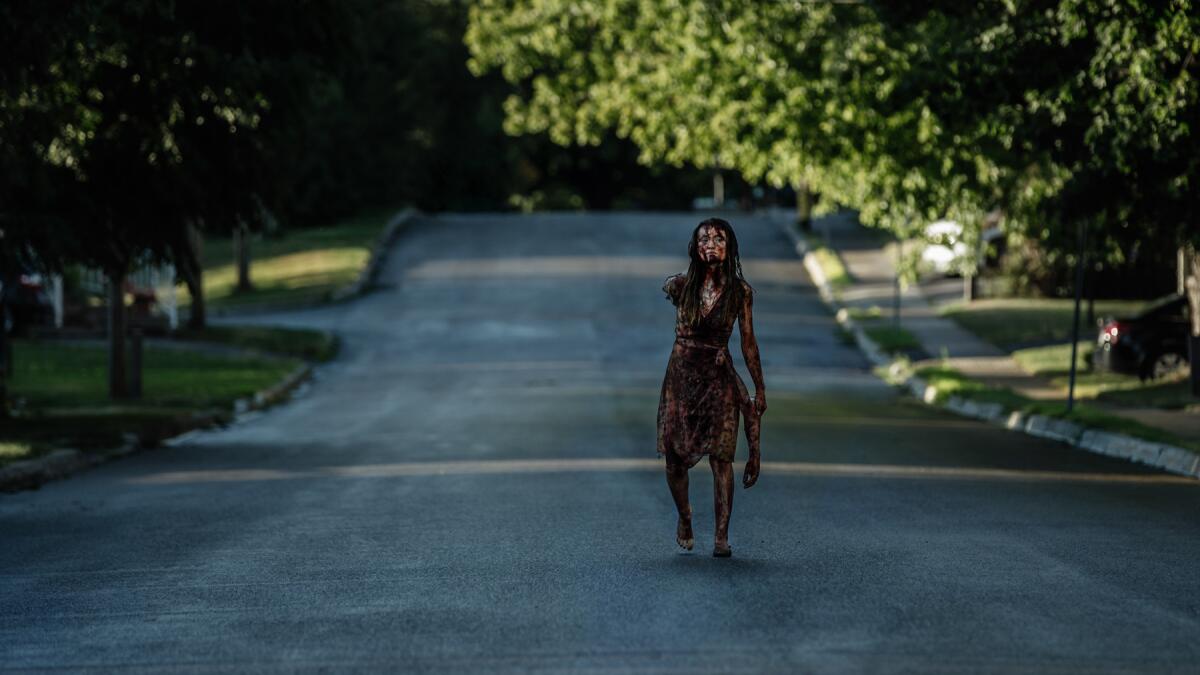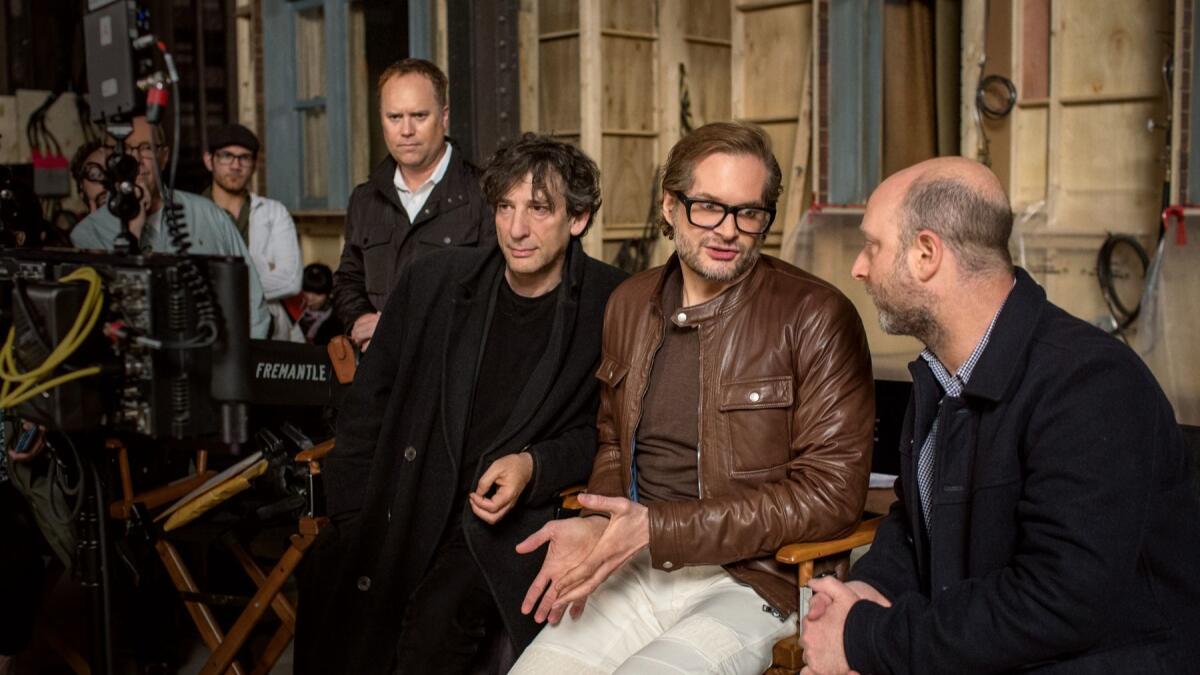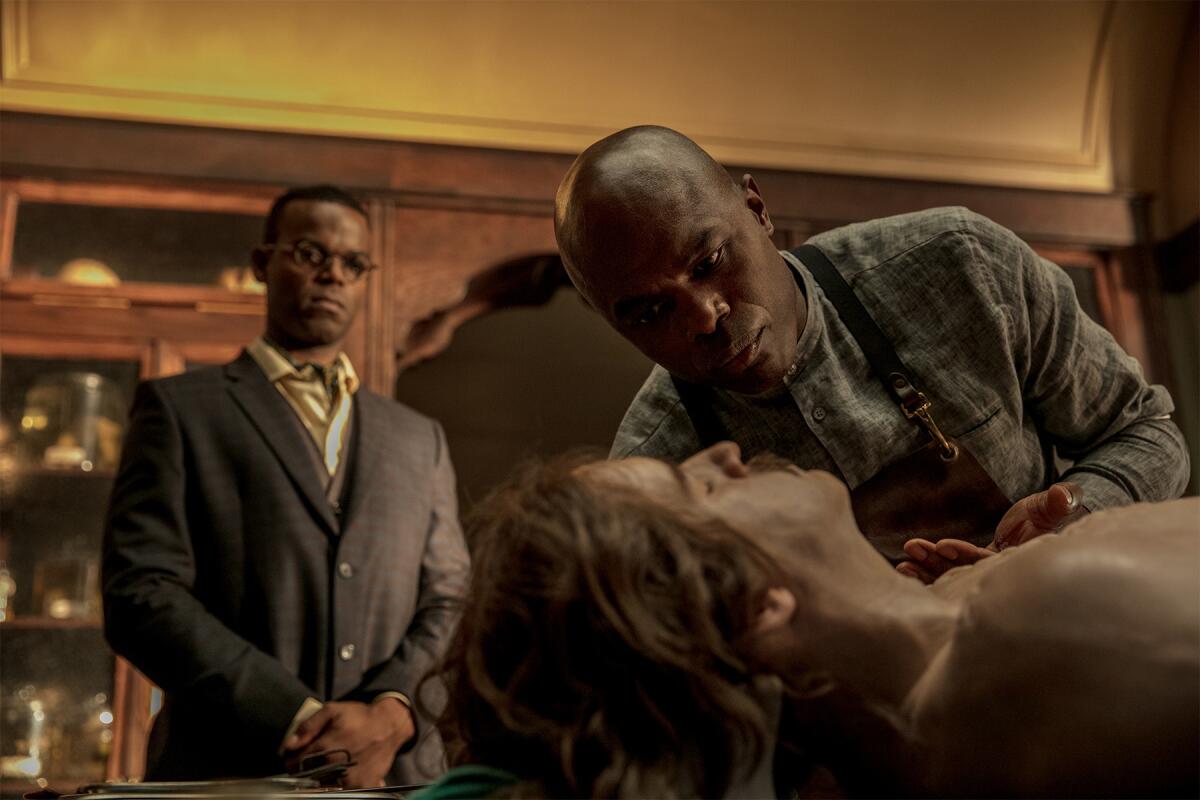Neil Gaiman on the ‘American Gods’ season finale and what’s on tap for Season 2
- Share via
The first season of Starz’s ambitious “American Gods” ended on the brink of a godly brawl. But Neil Gaiman, an executive producer of the series and author of the book from which it is adapted, teases that his divine road trip across the secret supernatural back roads of the United States is just beginning.
We briefly detoured Gaiman from his current duties scripting — either the fourth or fifth draft — his next project (a limited-series retelling of “Good Omens,” a book he co-authored with the late Terry Pratchett) to discuss his plans for his cast of deities, and find out what was it like returning to the world he dreamed up over a decade ago, now with co-show-runners Bryan Fuller (“Hannibal”) and Michael Green (“Kings”).
For those who have yet to finish the first season of “American Gods,” in which ancient deities clash with modern gods in the United States in a quest for power, this is your spoiler alert.
Did you have an emotional reaction to the end of the first season of “American Gods?”
I have all sorts of emotions. I'm fascinated by the fact that Amazon has created a bunch of new charts and right now, six weeks on the list, “American Gods” is the fifth-most-read book in America. It's drifted down from the fourth-most-read book. That actually is a weird, magical gift of television. Here's a book that was published 16 years ago and yet people in volume are going out and listening to the audiobook and reading it on their Kindles and buying it in the flesh. I love that. I'm fascinated by how involved people are. How grumpy they are about the fact that, now they got their eight episodes, they have to wait for another season. I love watching the joy of having faces that plug into these characters who were names and descriptions in the book. I'm loving seeing how people argue online.
There are people out there who think Laura [Moon, played by Emily Browning] is the best female character that they've ever seen on television. And there are people who would pay good money to make sure that she never appears on their screen ever again, but they love the whole series apart from her.

Where do you fall on the Laura Moon argument?
I think that's like saying to God, “OK, so are you on the side of the foxes getting to eat the chickens or are you on the side of the chickens getting to escape the foxes?” God gets to go, “Ah, it doesn't really work like that.” You get to stand up here and go, “These things are good. This is the world that is created.” I get to just stand there and say, “This is good.”
What did you learn watching this series, or rather, watching people watch the show?
I think watching people watch the television show, weirdly, is the biggest thing. There's stuff which I had long ago emotionally stopped thinking about or thinking about as powerful. An example is the initial Bilquis [Yetide Badaki] scene. I remember the thrill of coming up with the idea for the scene. I remember the delight of writing it. I remember deciding to stick it in the book at the end of Chapter 1 on the basis that anybody who was going to be out-weirded by it could stop reading now and go away. All of that stuff completely fascinated me.
What I love is the amount of people who are just going, “I don't know what I just saw.” There's a certain joy in that for me. I'm so proud of Bryan Fuller and Michael Green, they took the things in the book that people would've been tempted to go, “OK, so we'll leave out that, that's just too weird,” and they made damn sure they put them in.

How involved were you in the extended material?
What tended to happen was when they would get themselves stuck, that's when my phone would ring. Normally it would be Michael, because I think he is the designated “call Neil when we're stuck” person of the two, which it's not that Bryan doesn't talk to me. Bryan talks to me a lot but when they get stuck the phone would ring and it would be Michael and they would ask, “This is what we're stuck on. What do you think? This is where we were but this episode no longer exists.”
Then normally I would say, “Well, why don't you do this? Why don't you do that?” A lot of the time that was relatively easy for me because I've known these characters a lot longer than anybody else.
How involved were you in expanding Laura Moon's story?
One of the things that I was saying from the word go was Episode 3 or 4 should probably be Laura's story. There was so much stuff that I knew that I couldn't do when I was writing the novel. For most of the novel you’re basically stuck inside [main character] Shadow's [Ricky Whittle] head. You're looking out at the story through Shadow's eyes. But the great thing about a TV show is you're not stuck with Shadow anymore. We can see things from outside and we can see things that Shadow wasn't there for.
From that point of view it seemed like a great opportunity to expand on the things which we were stuck with in the book. The version of Laura and Shadow that Michael and Bryan cooked up, I like. The Laura in the book is a small-town travel agent. There are no small-town travel agents anymore. They have gone the way of the buggy-whip sellers and the people who would hand write letters home for you. They don't exist. We were going to have to create a new back story for her anyway. They wanted the casino and I think what they did is kind of wonderful.
Is there a particular moment where you helped expand the story that sticks out in your head?
When we knew that the original season closer was not going to happen, that we were kicking that plot forward and we were going to see that in Episode 1 or 2 of the next season. With that, I got the phone call from them basically saying ,.. “ now we're not going to be going there, so what do you suggest?
I said, “Well, one of the things that I think we should give them at this point in the story then is the ‘I am Odin’” [speech.]
I love that speech. I'm just continually amazed at the way they've gone into the book and plundered dialogue and plundered the writing and put it on the screen and I said, “Oh, whoa! That was what I wrote.”
Do you have a favorite god introduction from the first season?
I love Mr. Nancy's speech. Orlando's [Jones] speech is so astonishing. I'm proud to have had anything to do with it and I had barely anything to do with it.
When you cast someone like Orlando for that role, does that character change in your head when you think about them?
It's a weird mixture of both. I think it's really a good thing that I come from the world of comics... stories could happen slightly differently. I've [experienced] this before with things. The Coraline of the book is not the Coraline of the movie, but I loved the Coraline of the movie.
One day I'm sure I'll get to write the second “American Gods” novel, and when I do you'll get my take on Vulcan and Shadow will still be Shadow, the one in the book. [However,] I can't see myself writing any line to be said by Wednesday without hearing Ian McShane reading it in the background.

What gods are you excited about introducing in the second season?
I'm so excited about the whole thing. It's not just the gods. There's characters who we have not yet met. Characters we haven't yet cast or written. Samantha Black Crow, who's in the book and has not yet shown up and so looking forward to meeting her. There's a lot of seeing what's going to happen if we go to Cairo, Ill. I'm fascinated by that, because Cairo has changed since I wrote the book even.
When I was in Cairo in 1999 it was sad, but you didn't feel it was dead. Now I read a whole thing about how they're closing down the public housing because it's unfit for human habitation, which means a lot of the people there are going to go away, that’s probably the death knell to something that was once one of the biggest and most thriving inland ports. It had this amazing place in history and it's dead. I’m going, “OK, what does that mean? For Ibis and Jacquel what does that mean?” We're going to find out.
Do you think there could be three seasons?
I would expect four or five, honestly.At some point you you have to get to House on the Rock.
We'll be at the House on the Rock next season at the beginning and we'll get to Cairo, Ill., and maybe if we're really lucky we'll reach Lakeside.
I wouldn't be surprised if Lakeside isn't [until] Season 3, and then we've got a big war. We've got wars brewing and little battles, but the actual main war, that's at least a season, possibly even more. Again, we'll find out.
While filming “American Gods” the topic of immigration, a central theme in the book and the series, became a national conversation. As the creator, what was that like?
I would much rather be living in a much duller world in which we were significantly less part of the news. … Given that we are living in this world, I find it really strange that things that seemed not at all contentious when I wrote them 15, 16, 17 years ago, are now absolutely a huge important part of the national discussion.
See the most-read stories in Entertainment this hour »
Twitter: @MdellW
ALSO:
'Westworld' stars confront the nature of the fembot
Negan promises he's 'just getting started,' but have 'Walking Dead' fans already seen enough misery?
For the love of monsters: An insider tour of Guillermo del Toro's Bleak House before his LACMA show
The biggest entertainment stories
Get our big stories about Hollywood, film, television, music, arts, culture and more right in your inbox as soon as they publish.
You may occasionally receive promotional content from the Los Angeles Times.








